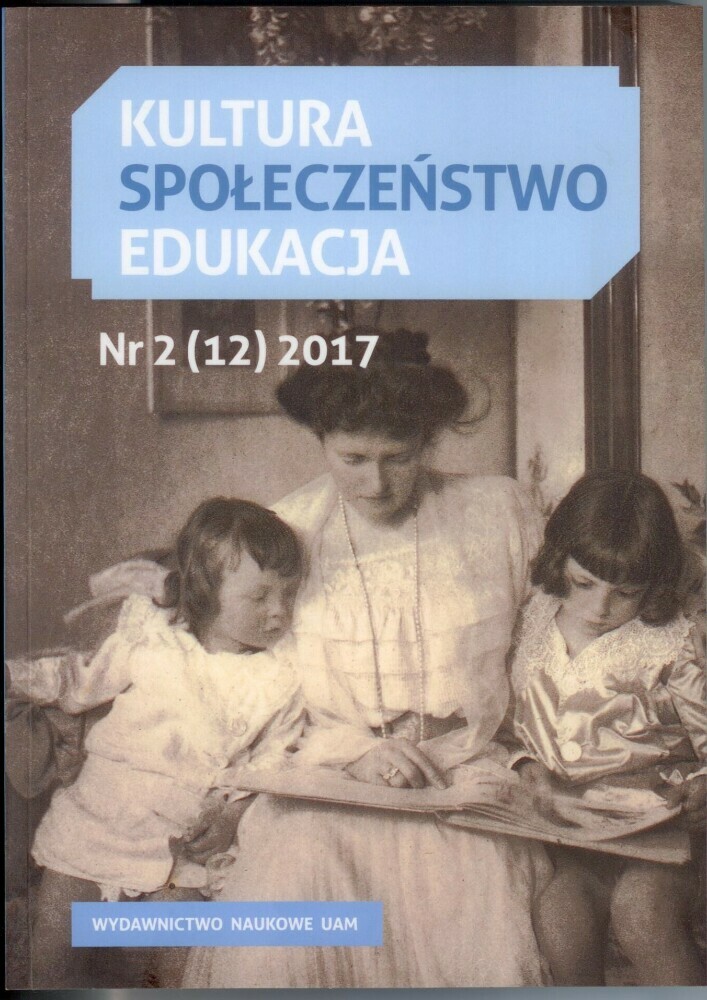Abstrakt
In article I engage the Bartleby. His strategy, resistance and the relation to the dominant language are treats as a radical critique of discourse. Bartleby can show us a different style of critique that is coherence with paradigm of the study. My analyzed is located on the field on the philosophy of education and should be understood as developing of mentioned paradigm.
Bibliografia
Agamben G. (2009). Bartleby, czyli o przypadkowości. Tłum. S. Królak. [W:] H. Melville. Kopista Bartleby. Historia z Wall Street. Tłum. A. Szostakiewicz. Warszawa.
Benjamin W. (2011). Ulica jednokierunkowa. Tłum. B. Baran. Warszawa.
Beverungen A. Dunne S. (2007) „I’d Prefer Not To”. Bartleby and the excesses of interpretation. “Culture and Organization” 13(2), s. 173.
Bianchi R. (2011). Melville’s process: Writing as performing. “Leviathan” nr 13(3).
D’Hoest F., Lewis T.E. (2015). Exhausting the fatigue university: in search of a biopolitics of research. “Ethics and Education” nr 10(1).
Deleuze G. (2004). Foucault. Tłum. M. Gusin. Wrocław.
Deleuze G. (2016a). Bartelby, czyli formuła. [W:] G. Deleuze. Krytyka i klinika. Tłum. B. Banasiak, P. Pieniążek. Łódź.
Deleuze G. (2016b). Co mówią dzieci. [W:] G. Deleuze, Krytyka i klinika. Tłum. B. Banasiak, P. Pieniążek. Łódź.
Derrida J. (2016). Widma Marksa. Stan długu, praca żałoby i nowa Międzynarodówka. Tłum. T. Załuski. Warszawa.
Ford D.R. (2016). Teaching, learning, and studying in the Baltimore Rebellion. “Policy Futures in Education” nr 14(2).
Krips H. (2012). Politics of overconformity: Bartleby meets Žižek. “Communication and Critical/Cultural Studies” nr 9(3).
Kristeva J. (2007). Czarne słońce. Melancholia i żałoba. Tłum. M.P. Markowski, R. Ryziński. Kraków.
Lewis T.E. (2013). On Study. Giorgio Agamben and Educational Potentiality. London, New York.
Lewis T.E. (2014). It’s a profane life: Giorgio Agamben on the freedom of im-potentality in education. “Educational Philosophy and Theory” nr 46(4).
Marx L. (1953). Meiville’s Parable of the Walls. „The Sewanee Review” nr 61 (4).
McCall D. (1989). The Silence of Bartleby. Ithaca.
Melville H. (2009a). Kopista Bartleby. Historia z Wall Street. Tłum. A. Szostakiewicz. Warszawa.
Melville H. (2009b). Bartleby, The Scrivener: A Story of Wall Street. Lexington.
Paryż M. (2002). Iluzje dyskursu: narrator jako “psychiatra” w wybranych utworach Hermana Melville’a, Nathaniela Hawthorne’a i Edgarda Allana Poego. [W:] G. Gazda, A. Izdebska, J. Płuciennik (red.). Wokół gotycyzmów. Wyobraźnia, groza, okrucieństwo. Kraków.
Pospiszyl M. (2016). Zatrzymać historię. Walter Benjamin i mniejszościowy materializm. Warszawa.
Reed N.C. (2004), The Specter of Wall Street: „Bartleby, the Scrivener” and the language of commodities. “American Literature” nr 76(2).
Schultz R.T. (2011). White guys who prefer not to: from passive resistance („Bartleby”) to terrorist acts (fight club). “The Journal of Popular Cultura” 44(3).
Solomon A. (2004). Anatomia depresji. Demon w środku dnia. Tłum. J. Bartosik. Poznań.
Springer N. (1965). Bartleby and the terror of limitation. “PLMA” nr 80(4).
Swoboda T. (2010). Historie oka. Gdańsk.
Vanhoutte K.K.P. (2014). Bartleby the example and Eros the idea of the work: some consideration on Giorgio Agamben’s “The idea of study”. “Educational Philosophy and Theory” nr 46(4)/2014.
Licencja
Prawa autorskie (c) 2019 Oskar Szwabowski

Utwór dostępny jest na licencji Creative Commons Uznanie autorstwa – Bez utworów zależnych 4.0 Międzynarodowe.
